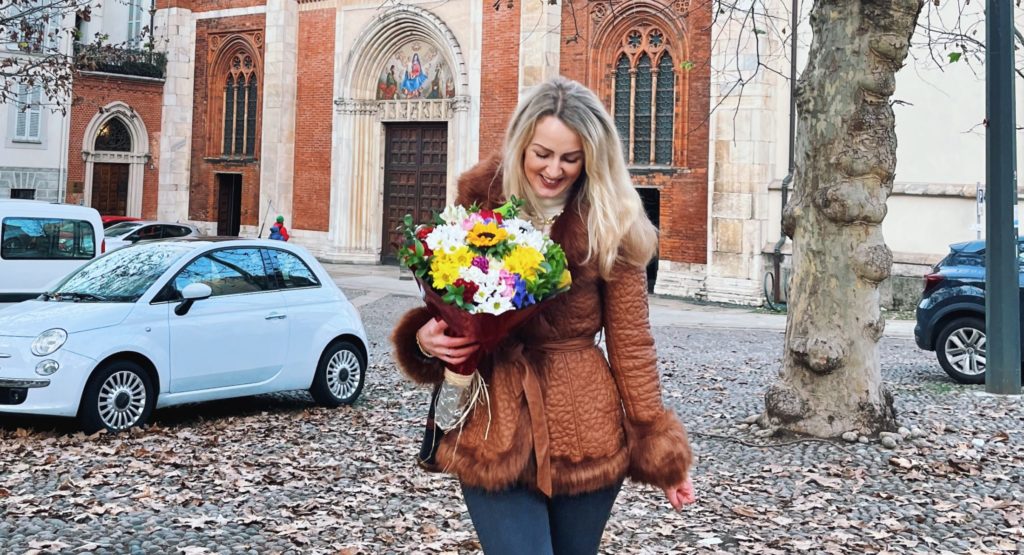Yes, here it is: another Monday blog! Three weeks have passed already since I published the last one. I did start putting something on paper last weekend, but then the sun took hold of me. And that’s how a new week dawned in which it was time for five full nights of Sanremo, the historic festival of Italian music. I already wrote about it last year, how I think that every country should have its own Sanremo festival, because it’s so much more than just a song contest.
Daring to dream big is perhaps the greatest art of life, he continued, because: “chi sogna arriva prima di chi pensa”
On the first evening, even the President of Italy, Signor Sergio Mattarella, was present. Roberto Benigni – the Tuscan actor world-famous for his stunning portrayal in the film La Vita è Bella – opened the festival with a speech in which he addressed a few very meaningful things: the importance of Article 11 in the Constitution for example, which gives everyone the right to express their own opinions and how we must respect and even free each other in doing so. Something, Benigni said, that our ancestors could only dream of. Daring to dream big is perhaps the greatest art of life, he continued, because: “chi sogna arriva prima di chi pensa”. Translated: the one who dares to dream gets much further than the one who thinks only rationally.
“Pensati libera” were the words written on the stole draped over her shoulders as she made her grande entrance and strode down the grand staircase of the Ariston theatre: “think yourself free”
Just like every year, host Amadeus had invited co-hosts to join him in presenting the show. On the first evening and on the last, it was Chiara Ferragni, Italy’s most famous fashion blogger and business woman. On the first evening alone, she appeared in no less than four different dresses, all specially designed for her with an important message she wanted to convey to the people. Statements against the body-shaming of women, against online bullying, and against the gender stereotypes. “Pensati libera” were the words written on the stole draped over her shoulders as she made her grande entrance and strode down the grand staircase of the Ariston theatre: “think yourself free”. Because we all have the power within us to do so.
In my view, it is precisely the Italian language that makes Sanremo truly Sanremo, as it has been for seventy-three years already
Actually so much happens at the Sanremo festival that you would almost forget that it’s fundamentally a song contest. But it is and always will be. And what a contest it is! All songs are sung one hundred percent live, and – and this seems quite unique on television these days – accompanied live by a large orchestra of strings, horns and percussion, all top musicians in their field. Every artist who takes the stage at the Ariston Theatre in Sanremo brings their own maestro, a conductor or musical director. Of course, it is and remains an Italian festival, and every song must therefore be Italian-spoken. In my view, it is precisely the Italian language that makes Sanremo truly Sanremo, as it has been for seventy-three years already.
At times it’s raw and super direct, and at times it’s incredibly poetic
Because what a beautiful language it is, Italian, and certainly not only for the more romantic songs. Two years ago, Mäneskin showed us with their winning song Zitti e Buoni that the Italian language also lends itself perfectly to lyrics of protest. At times it’s raw and super direct, and at times it’s incredibly poetic. And sometimes even simultaneously. And that’s exactly its secret, if you ask me. Italian is a language in which you can express things so incredibly poetically but with such apparent ease at the same time, that it has a certain nonchalance about it. A simple Italian sentence is sometimes a work of art in itself. And not only the singers at Sanremo know how to do that.
It’s without a doubt one of the sweetest, most thoughtful things anyone has ever said about/to me
Because three weeks ago, when I went to lunch with Julia – a very good friend of mine who also lives here in Milan – she had brought me a beautiful, large, brightly coloured bouquet of flowers. She had attached a bright green little note to it, on which she had quickly scribbled a little text, just outside in the street on the way from the flower stand to me. But this was what it said “Per te, perché per me sei un giardino di gioie”. In other words, “For you, because to me you are a garden of joys”. It’s without a doubt one of the sweetest, most thoughtful things anyone has ever said about/to me, and along with the bouquet of all the different colourful flowers, simply so perfect. And although the flowers have since wilted, the note still hangs in my kitchen, where I can see it every morning. This morning, Sunday morning and the day after the big Sanremo final, I realised that this is exactly what the Italian language does to you. This is its charm, its power and the reason why millions of people around the world consider Italian irresistible. Something the Sanremo festival proves every year again. I am a fan.
P.S. In the light of the upcoming Valentine’s Day, I think Julia is okay with you copying her beautiful lyrics…
